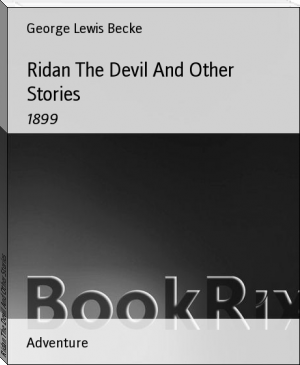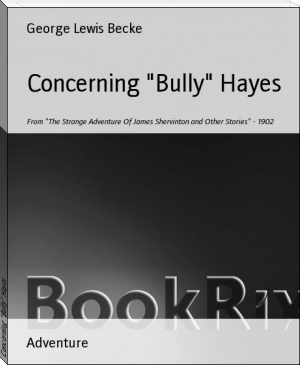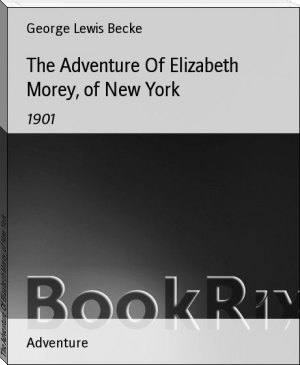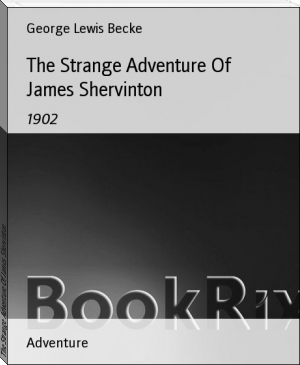Ridan The Devil And Other Stories, George Lewis Becke [best sci fi novels of all time txt] 📗

- Author: George Lewis Becke
Book online «Ridan The Devil And Other Stories, George Lewis Becke [best sci fi novels of all time txt] 📗». Author George Lewis Becke
That night, whilst Masters and Laurance, cigars in mouth, were gravely picking out the former's trade goods on board the _Palestine_ the White Lady and the Brown 'Woman' talked.
'Is you any better now?' said Melanie, as she caressingly ran her hand down the golden locks of Mrs Laurance.
A smothered sob was her answer, and the yellow head buried itself among the pillows of the couch.
Melanie turned away despairingly, and then lit a cigarette. What a fool was this beautiful white woman--nothing but sob, sob, sob! What could be done to dry her tears?
Presently the Brown 'Woman' slid her hand under the waist of the weeping White Lady, and pressed her cheek to hers.
'Don' you wan' to stay here now?'
'No, no, no! Let me go away. I wish I were dead!'
'What for?' and the philosophical Melanie sent two long streaks of smoke through her nostrils. 'Why are you 'shamed? You have a husban' now, and yo' don' wan' to _faotane_, do you?'
'What is _faotane?_'
Melanie laughed. '_Faotane_ is Samoa language; it means stealing a husban.... And yo' won' steal my husban' from me, will you? Yo' hav' got a new husban', and yo' won' take Tom from me, will yo'?'
Mrs Laurance sprang to her feet and placed her hands on the Brown 'Woman's' shoulders.
'Tell me,' she said, 'did he ever talk of me?'
'Yes,' said the truthful Melanie. 'He tell me that yo' have hair like gold, and that your eye was blue like the sky.'
'No more?'
Melanie shook her black locks. 'No more. My man never talk too much. You like to eat some roast pigeon now?'
The White Lady turned her head aside and sobbed. 'And for a soulless being like this!' Then she remembered that Masters was not to blame, and waited, trembling and sobbing, for the two men to return.
* * * * *
Masters, having finished his business on board the barque, held out his hand to Laurance.
'Good-bye, Harry. Nothing can be done. Tom Masters was drowned off Beveridge Reef years ago, and Harry Laurance married his widow; and Tom Patterson is another man, who has a native wife, and--'
He wrung Laurance's hand, sprang up the companion-way and called to his boat's crew,--
'Haul the boat alongside, boys. I'm going to Pito-fanua again; and you beggars will have to pull like hell.... Good-bye, Harry, old fellow. Send your boat ashore for your wife... and God bless you both!'
WITH HOOK AND LINE ON AN AUSTRAL RIVER
The English visitor to the Eastern Colonies of Australia, who is in search of sport with either rod or hand line, can always obtain excellent fishing in the summer months, even in such traffic-disturbed harbours as Sydney, Newcastle and other ports; but on the tidal rivers of the eastern and southern seaboard he can catch more fish than he can carry home, during nine months of the year. In the true winter months deep sea fishing is not much favoured, except during the prevalence of westerly winds, when for days at a time the Pacific is as smooth as a lake; but in the rivers, from Mallacoota Inlet, which is a few miles over the Victorian boundary, to the Tweed River on the north, the stranger may fairly revel, not only in the delights of splendid fishing, but in the charms of beautiful scenery. He needs no guide, will be put to but little expense, for the country hotel accommodation is good and cheap; and, should he visit some of the northern rivers, where the towns--or rather small settlements--are few and far between, he will find the settlers the embodiment of British hospitality. Some five years ago the writer formed one of the crew of a little steamer of fifty tons, named the _Jenny Lind_, which was sent out along the coast in the futile endeavour to revive the coast whaling industry. Through stress of weather we had frequently to make a dash for shelter, towing our one whale-boat, to one of the many tidal rivers on the coast between Sydney and Gabo Island. Here we would remain until the weather broke, and our crew would literally cover the deck with an extraordinary variety of fish in the course of a few hours. Then, at low tide, we could always fill a couple of corn sacks with excellent oysters, and get bucketfuls of large prawns by means of a scoop net improvised from a piece of mosquito netting. Game, too, was very plentiful on the lagoons. The settlers were generally glad to see us, and gave us so freely of milk, butter, pumpkins, etc., that, despite the rough handling we always had at sea from the weather, we grew quite fat. But as the greater part of my fishing experience was gained on the northern rivers of the colony of New South Wales, it is of them I shall write. Eighteen hours' run by steamer from Sydney is the Hastings River, on the southern bank of which, a mile from the bar, is the old-time town of Port Macquarie--a quaint, sleepy little place of six hundred inhabitants, who spend their days in fishing and waiting for better times. There are two or three fairly good hotels, very pretty scenery along the coast and up the river, and a stranger can pass a month without suffering from _ennui_--that is, of course, if he be fond of fishing and shooting; if he is not, he should avoid going there, for it is the dullest coast town in New South Wales. The southern shore, from the steamer wharf to opposite the bar, is lined with a hard beach, on which, at high tide or slack water at low tide, one may sit down in comfort and have great sport with bream, whiting and flathead. As soon as the tide turns, however, and is well on the ebb or flow, further fishing is impossible, for the river rushes out to sea with great velocity, and the incoming tide is almost as swift. On the other side of the harbour is a long, sandy point called the North Shore, about a mile in length. This, at the north end, is met by a somewhat dense scrub, which lines the right bank of the river for a couple of miles, and affords a splendid shade to anyone fishing on the river bank. The outer or ocean beach is but a few minutes' walk from the river, and a magnificent beach it is, trending in one great unbroken curve to Point Plomer, seven miles from the township.
Before ascending the river on a fishing trip one has to be provided with a plentiful supply of cockles, or 'pippies,' as they are called locally. These can only be obtained on the northern ocean beach, and not the least enjoyable part of a day's sport consists in getting them. They are triangular in shape, with smooth shells of every imaginable colour, though a rich purple is commonest. As the backwash leaves the sands bare, these bivalves may be seen in thick but irregular patches protruding from the sand. Sometimes, if the tide is not low enough, one may get rolled over by the surf if he happen to have his back turned seaward. Generally I was accompanied by two boys, known as 'Condon's Twins.' They were my landlord's sons, and certainly two of the smartest young sportsmen--although only twelve years old--I ever met with. Both were very small for their age, and I was always in doubt as to which was which. They were always delighted to come with me, and did not mind being soused by a roller now and then when filling my 'pippy' bag. Pippies are the best bait one can have for whiting (except prawns) in Australia, for, unlike the English whiting, it will not touch fish bait of any sort, although, when very hungry, it will sometimes take to octopus flesh. Bream, whether black or silvery, flathead, trevally, Jew-fish, and, indeed, all other fish obtained in Australia, are not so dainty, for, although they like 'pippies' and prawns best, they will take raw meat, fish, or octopus bait with readiness. Certain species of sea and river mullet are like them in this respect, and good sport may be had from them with a rod in the hot months, as Dick and Fred, the twins aforesaid, well knew, for often would their irate father wrath-fully ask them why they wasted their time catching 'them worthless mullet.'
But let me give an idea of one of many days' fishing on the Hastings, spent with the 'Twins.' Having filled a sugar-bag with 'pippies' on the ocean beach, we put on our boots and make our way through the belt of scrub to where our boat is lying, tied to the protruding roots of a tree. Each of us is armed with a green stick, and we pick our way pretty carefully, for black snake are plentiful, and to tread on one means death. The density of the foliage overhead is such that but little sunlight can pierce through it, and the ground is soft to our feet with the thick carpet of fallen leaves beneath. No sound but the murmuring of the sea and the hoarse notes of countless gulls breaks the silence, for this side of the river is uninhabited, and its solitude disturbed only by some settler who has ridden down the coast to look for straying cattle, or by a fishing party from the town. Our boat, which we had hauled up and then tied to the tree, is now afloat, for the tide has risen, and the long stretches of yellow sandbanks which line the channel on the further side are covered now with a foot of water. As we drift up the river, eating our lunch, and letting the boat take care of herself, a huge, misshapen thing comes round a low point, emitting horrid groanings and wheezings. It is a steam stern-wheel punt, loaded with mighty logs of black-butt and tallow wood, from fifty feet to seventy feet in length, cut far up the Hastings and the Maria and Wilson Rivers, and destined for the saw-mill at Port Macquarie.
In another hour we are at our landing-place, a selector's abandoned homestead, built of rough slabs, and standing about fifty yards back from the river and the narrow line of brown, winding beach. The roof had long since fallen in, and the fences and outbuildings lay low, covered with vines and creepers. The intense solitude of the place, the motionless forest of lofty, grey-boled swamp gums that encompassed it on all sides but one, and the wide stretch of river before it were calculated to inspire melancholy in anyone but an ardent fisherman. Scarcely have we hauled our boat up on the sand, and deposited our provisions and water in the roofless house, when we hear a commotion in the river--a swarm of fish called 'tailer' are making havoc among a 'school' of small mullet, many of which fling themselves out upon the sand. Presently all is quiet again, and we get our lines ready.
For whiting and silvery bream, rather fine lines are used; but we each have a heavy line for flathead, for these fish are caught in the tidal rivers on a sandy bottom up to three feet and four feet in length. They are in colour, both on back





Comments (0)